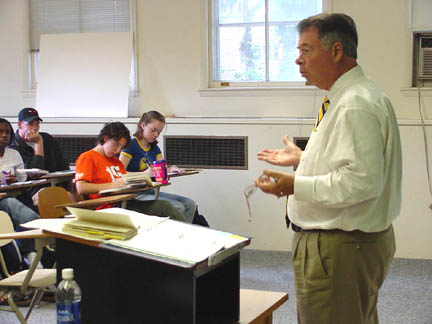Standards similar for professors and adjuncts

September 12, 2002
According to the Simpson College faculty handbook, “Simpson College expects of its faculty members sound scholarship, competent teaching, creativity, concern for students…and cooperation in the achievement of the declared purposes of the institution.”
“We expect professors to work at being good teachers and to care about their students,” said Bruce Haddox, academic dean.
While Simpson held high expectations of its faculty, as well as adjuncts, many professors had additional expectations of themselves.
Two common themes among professors were to be well prepared for class and to make the material they presented interesting.
“I do the best job possible to be prepared for class and to create a good learning environment to help my students in and beyond class,” said Marilyn Mueller, professor and chair of the management department.
“The ultimate thing I strive to achieve is to deliver information to inspire students to learn more and continue to learn outside the classroom,” said Maria DiPalma, music department chair.
Professors handled the challenge of many expectations in a variety of ways.
Mark Bates, associate professor of spanish and department chair of foreign language, felt little pressure to meet such high standards because the majority of the college’s expectations were already met in his normal workday.
“Being available to my students is not out of the realm of what I normally do,” Bates said.
DiPalma sometimes found it complicated to balance her many responsibilities.
“In the music department there is a lot of one-on-one interaction so we just have to make time,” DiPalma said.
Professors were not the only instructors expected to abide by strict college policies.
According to Haddox, Simpson hired a number of instructors to fill in courses it did not have enough full-time faculty to teach. Those teachers are called adjuncts. They were hired to teach courses in their specific areas of expertise.
Recent years have had larger numbers of adjunct professors in order to keep class sizes smaller.
“We expect all faculty, including adjuncts, to be highly qualified and do a good job teaching,” Haddox said.
“The college’s expectations of adjuncts are clearly articulated,” said Peter Taggart, adjunct professor of history.
Like many full-time professors, adjunct instructors set high standards for themselves.
Joe Walt, former full-time history professor and current adjunct professor of history, said, “I teach at exactly the same level and have the same quality of work as full-time faculty members. I teach the same way now as I did when I was full-time.”
Adjunct professors were often hired due to high levels of success in their respected fields. Doug Shull, retired chief financial officer of Casey’s General Store, is an adjunct professor of accounting because, “The profession was very good to me. I try to get my students to see the positive side of accounting.”
A common goal of full-time professors and adjunct instructors was to have a positive influence on their students’ lives.
“I try to be a ‘dream helper.’ Students have dreams and I am trying to help them achieve them,” said Shull.
“It’s rare to find an adjunct who teaches for the money. They just love teaching,” said Walt.
Some addjuncts and professors felt that their most important task is to prepare their students for life outside of college.
Haddox said, “The goal of all professors is to light a fire in their students.”












